Women's Football: Key Recommendations from the 'Raising the Bar' Review
Introduction
On 13 July 2023, the review into the future of domestic women’s football in England, “Raising the Bar: Reframing the Opportunity in Women’s Football” (the “Review”), was published.
The Review, chaired by former England and Great Britain footballer, Karen Carney MBE, was commissioned by the UK Government in September 2022, following England’s success in the UEFA Women’s Euro 2022 and further to the UK Government’s Fan-Led Review of Football Governance. It is the culmination of the consideration of evidence submitted by over 100 contributors, together with input from an expert panel, comprising former professional footballer, Ian Wright, former Lionesses head coach, Hope Powell, Chair of the Professional Game Academy Audit Company and Director of Women in Football, Jane Purdon, former Deloitte Global Lead Partner for Sports Business, Dan Jones, Secretary General of the International Working Group on Women and Sport, Lisa O’Keefe and NFL Head of Europe and UK and former CEO of World Rugby, Brett Gosper.
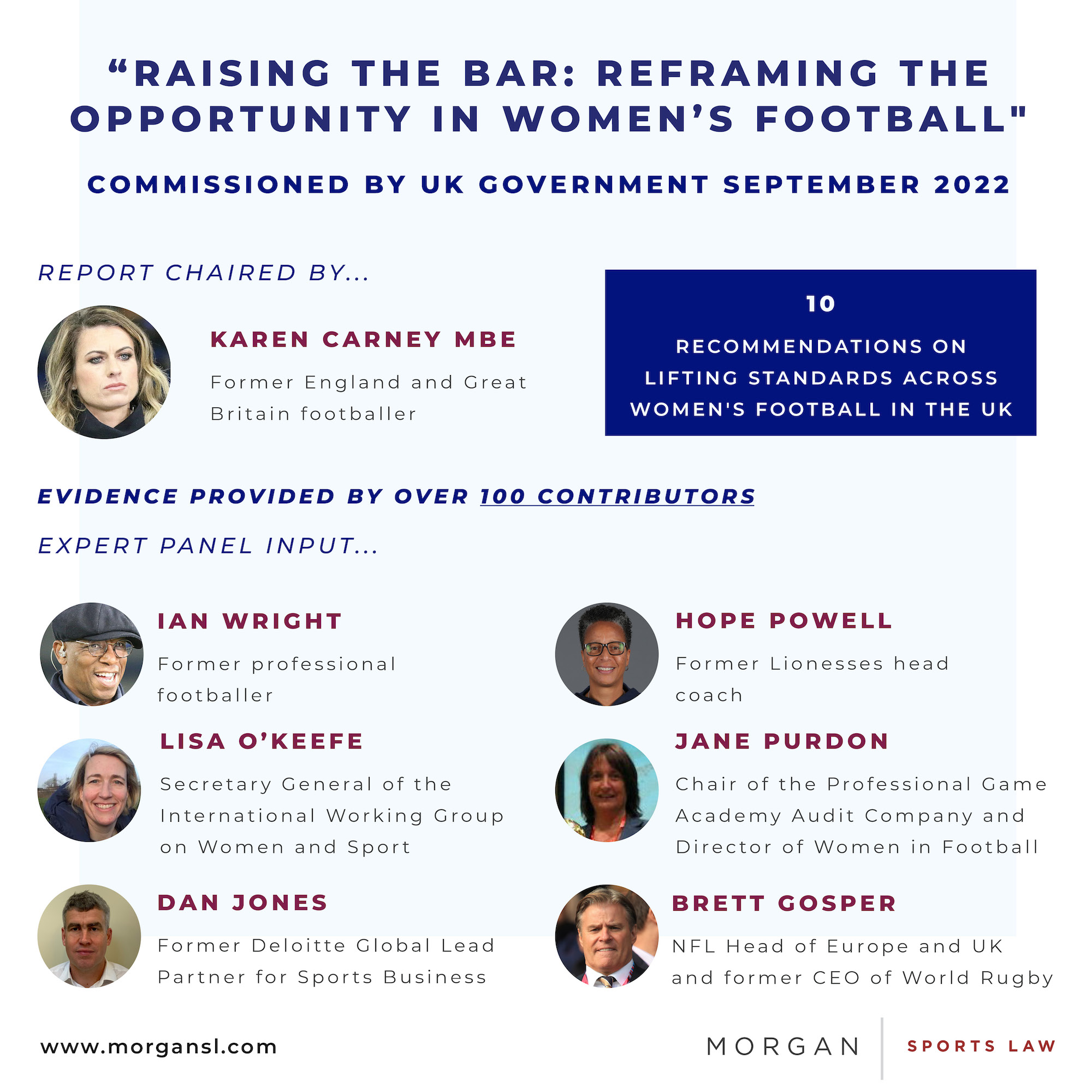
The Review makes ten recommendations aimed at capitalising on the immense potential of women’s football at a pivotal moment in the game, with a view to transforming women’s football in England into a world leading sport, generating substantial economic and social value and setting a “gold standard” for women’s professional sport around the world.
Lifting standards across the game
Central to the Review's vision is the imperative to elevate standards across the entire women's football landscape in England. The primary focus is on enhancing the professional environment while simultaneously fostering improvements throughout the pyramid. The concept of a “Virtuous Cycle” forms the foundation of this vision, highlighting the interdependence of various elements to drive progress. The cycle commences with setting higher minimum standards, leading to fully professional players and a sustainable talent pipeline, thereby elevating the quality of the on-pitch product. A larger, more engaged fanbase follows, attracting greater investment from broadcasters, sponsors, and owners, generating more money to flow through the pyramid and thereby creating a positive cycle of continuous growth.
The rise of women's football
Celebrating the remarkable progress made in women's football over the last few decades, the Review acknowledges the galvanizing impact of England's Lionesses' success in the UEFA Women’s Euro 2022. The 2022/23 season witnessed record-breaking attendances in the Women’s Super League and Women’s Championship, accompanied by an upswing in broadcast audience figures compared to the previous season. Moreover, the sport has seen encouraging signs of increased participation among school-age girls. Nevertheless, the review notes that, having been unfairly held back, the women's game is still in “startup mode”, with much work required to unlock its full potential. To drive progress, the review identifies four key areas:
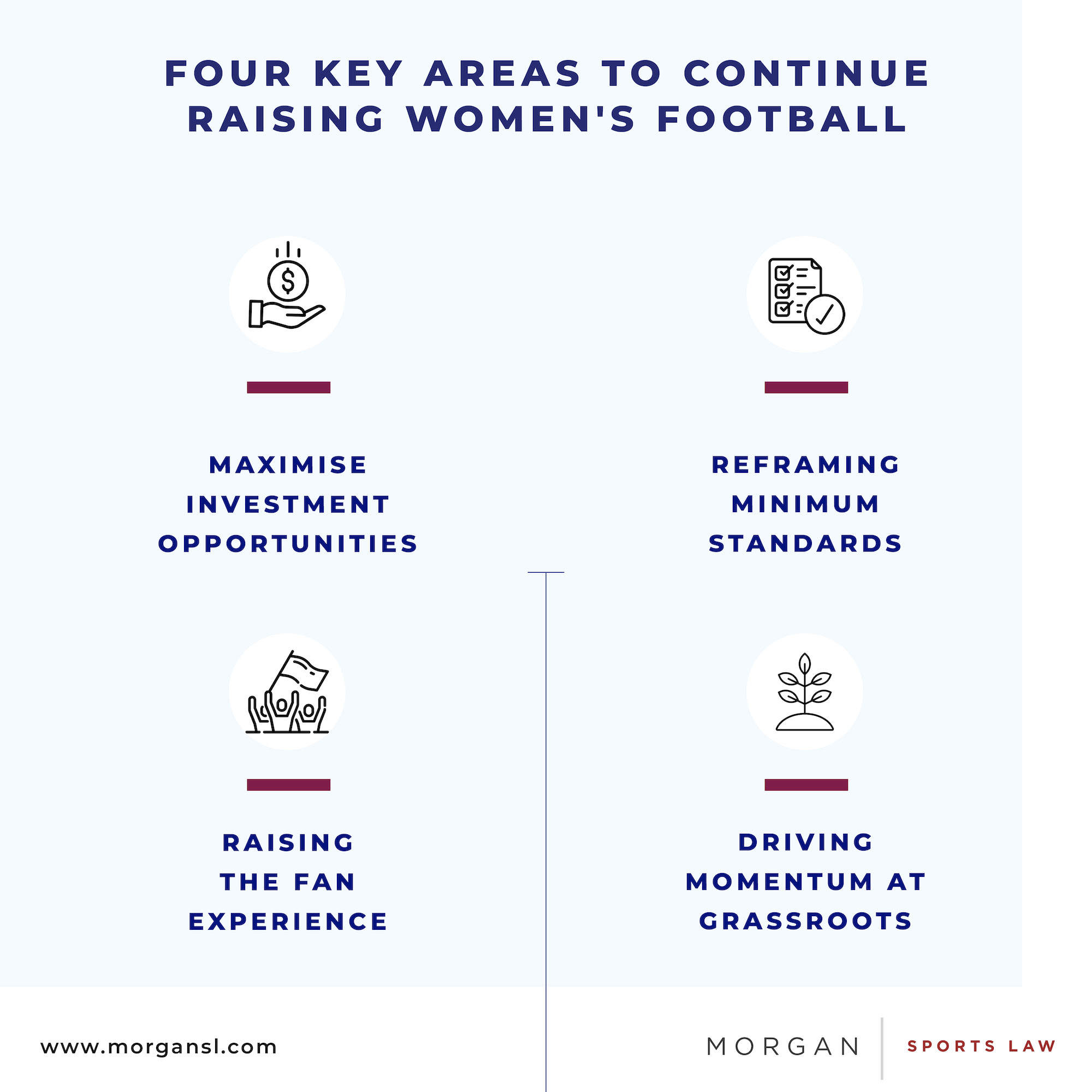
Generating an environment that maximises investment opportunities
The top two tiers — the Women's Super League and Women's Championship — will undergo a transition from integration within The FA to a newly created independent club-owned entity (“NewCo”).
The Professional Game Working Group (“PGWG”), comprising representatives from ten Women’s Super League and Women’s Championship clubs and senior FA officials, is entrusted with developing NewCo's long-term vision, business plan, and strategies for partnerships, investment, and governance.
The Review, therefore, recommends that NewCo aspire to achieve world-leading standards for players, fans, staff, and all stakeholders involved in the women's game.
In this regard, the Review highlights several key principles for NewCo:
- Foster a financially stable, competitively compelling game as the ultimate objective, through continued growth in matchday and sponsorship revenues, unlocking broadcasting revenue potential, and equitable distribution of revenue throughout the pyramid.
- Deploy stringent financial regulations to prevent the instability and failures seen in other sports, while encouraging self-regulation within the women's game.
- Provide the necessary professional infrastructure for players and staff to compete, entailing significant financial commitment.
- Unlock additional investment and funding streams, by considering innovative distribution calculations beyond final league position and equalising FA Cup prize money, which, the Review notes The FA “is in a position to address and would send a powerful message on equality”.
- Establish governance structures that empower NewCo to make independent decisions, protecting the voices of all clubs.
Reframing minimum standards for the professional environment
The Review highlights the significance of establishing a robust talent pathway to cultivate generation after generation of “world-beating Lionesses”—essentially driving fan engagement and investment.
Addressing challenges in developing young players, including by closing gaps in competitive playing opportunities for girls aged 11-14, is identified as a key priority. The Review advocates for identifying strategic partners willing to invest at the level needed to build a strong pipeline of domestic players.
To support clubs in the interim, the inclusion of more international talent than is currently permitted under the Governing Body Endorsement requirements is also recommended, to upskill domestic players and create a more interesting product for potential investors.
The Review's third recommendation emphasises that both the Women's Super League and Women's Championship should evolve into fully professional environments, attracting, developing, and sustaining world-class playing talent. Specific measures include:
- Bridging the gap in minimum operating standards between the two tiers, by phasing in increased minimum contact time in the Women’s Championship and introducing a salary floor in the Women’s Super League from the 2025/26 season and gradual salary increases, with a view to introducing a salary floor, in the Women’s Championship.
- Providing a “gold standard” of physical and mental health provision, including a centrally funded research unit, mandatory performance psychologists and extended medical support for players transitioning out of the game.
- Mandating elite training facilities for players.
- Implementing a world-leading parental package, sharing best practice with other women’s sport, to support players wishing to become parents during their careers.
- Funding comprehensive union representation for players in both tiers.
- Offering best-in-class career transition support for players leaving the professional game.
Addressing the lack of diversity across women's football is also highlighted as an urgent recommendation. Kick It Out succinctly underscored this issue, as follows:
“We need to ensure that football appeals to everyone and is accessible to everyone. The relative absence of women of colour from the elite game and its feeder leagues needs to be addressed.”
The Review also cites Fair Game UK's findings that gender diversity positively impacts sports clubs’ financial performance, further reinforcing the need for change.
Consequently, the review urges The FA to publish data on existing diversity and inclusion interventions, establish workforce data to identify representation gaps, and develop a workforce strategy based on this research.
Raising the bar on fan experience
Capitalising on the growing popularity of women's football is vital for the sport's sustainable growth. To achieve this, the Review presents two recommendations:
- Collaboration with The FA, Premier League, English Football League, and broadcasters to create a new dedicated broadcast slot for women's football, addressing current scheduling inconsistencies and enabling fans to engage with the sport conveniently.
- Clubs to value and support their fans better, by introducing license requirements for a dedicated women's football marketing resource and annual reviews of club ticketing policies. The Review also calls for higher standards of safety at grounds, clubs’ fan engagement measures to include meaningful representation for women's team fans and the appointment of supporter liaison officers for Women's Super League and Women's Championship clubs.
Driving momentum in the grassroots game
To ensure football is an inclusive and welcoming environment for all women and girls, which supports the talent pool and generates a wider social impact, for example in tackling inequality and providing physical and mental health benefits, the Review proposes three recommendations:
- The government must fulfill its recent commitments concerning equal access to school sport for girls.
- All involved in funding grassroots facilities should collaborate to increase investment, providing enhanced access to high-quality facilities outside of school.
- The FA, Premier League, and Football Foundation should work collectively to channel funding into facilities across the women's football pyramid. A revised strategy should ensure greater access to grants for many clubs and uphold accountability regarding the commitment to women and girls at local facilities.
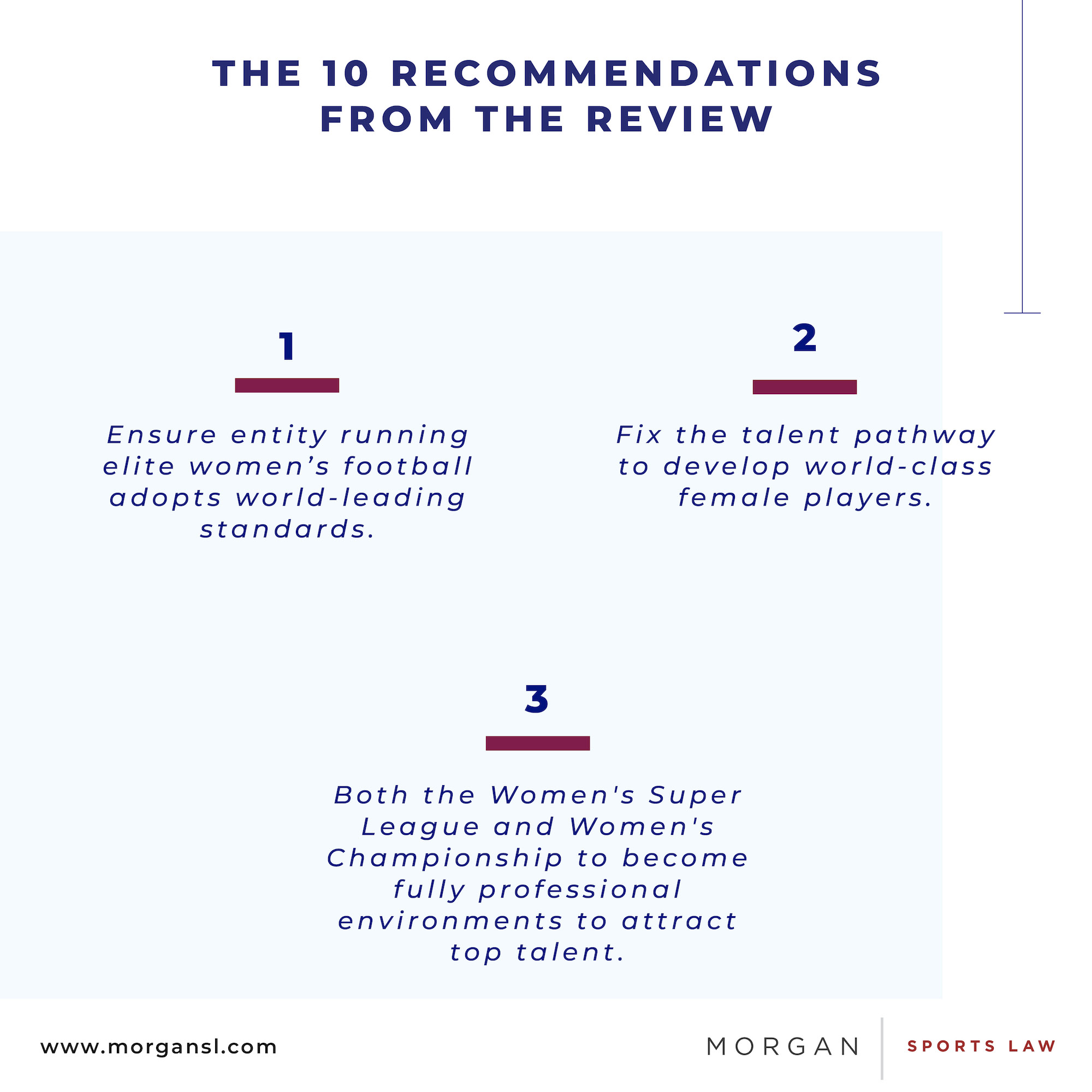
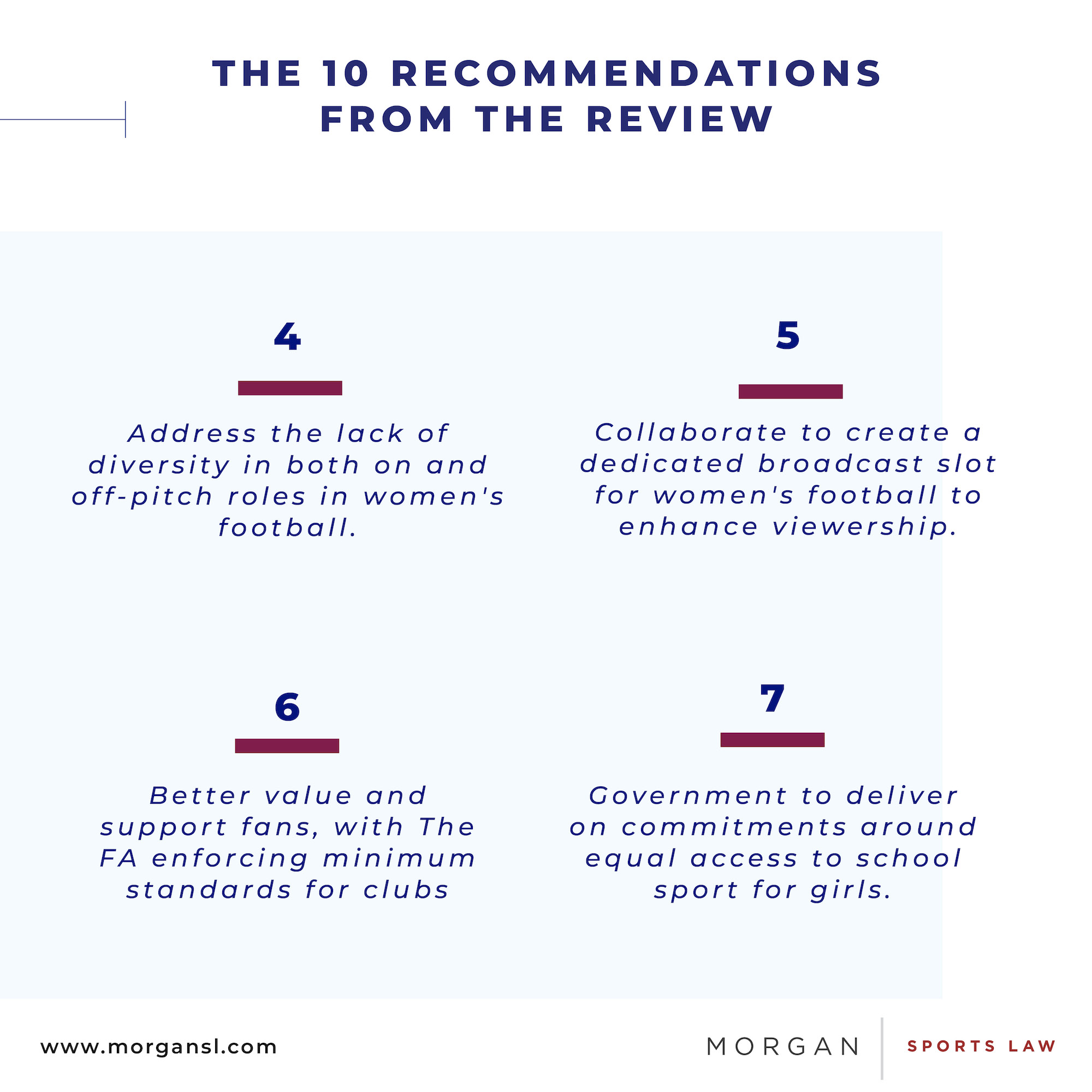
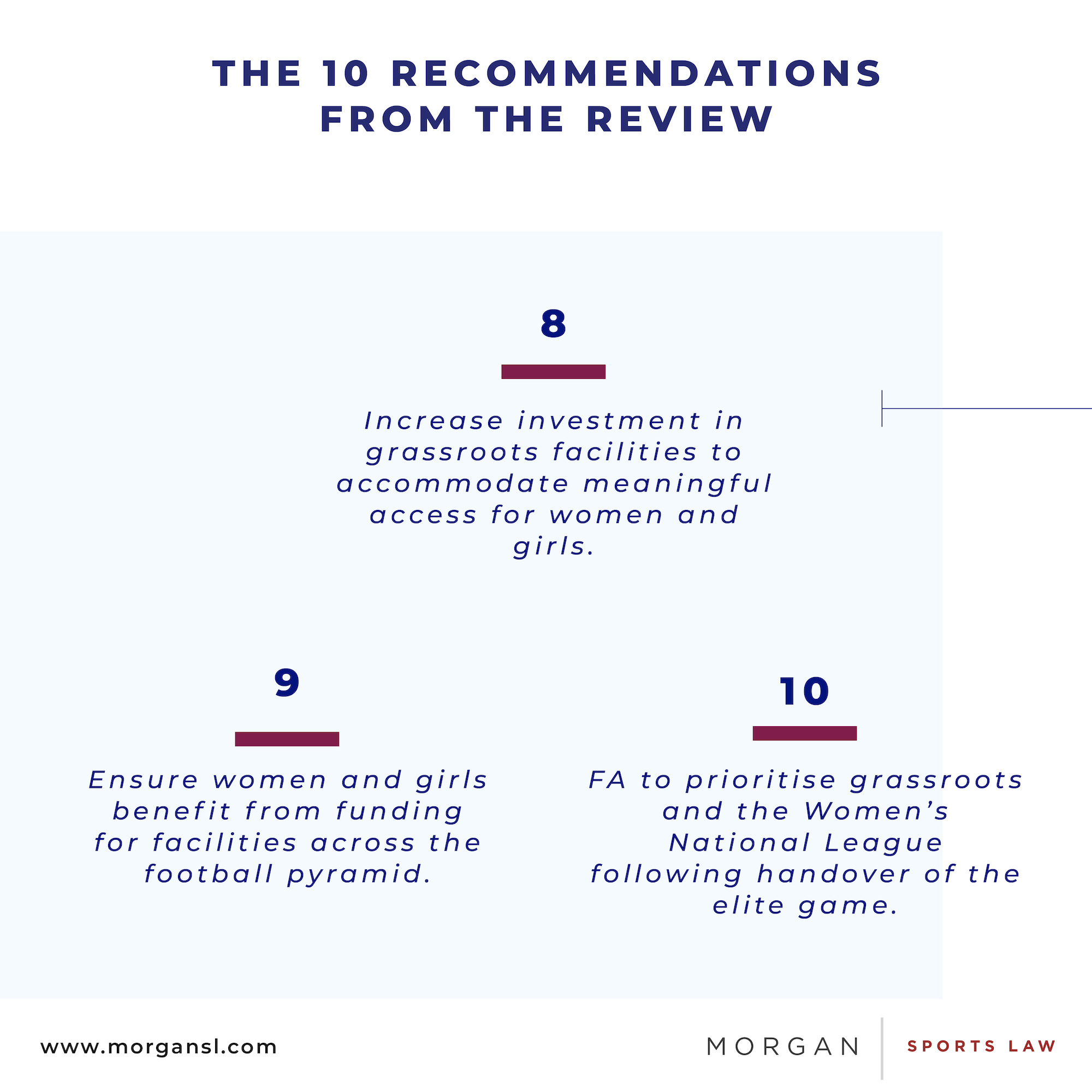
Conclusion
In short, the Review highlights that women’s football in England is at an exciting turning point, where there is a real opportunity to unlock its significant financial potential, improve the game for future generations and provide valuable positive social impact.
The Review’s wide-ranging recommendations emphasise the urgent need to lift standards across the professional environment, whilst also implementing changes that benefit the whole of the pyramid.
These recommendations will rely on buy-in from all stakeholders, but crucially they require a commitment to serious financial investment from The FA and any strategic partners, to drive the game forward and encourage increased outside investment, so that women’s football in England can reach its full potential.
With such commitment, the Review is confident that there is a real chance for women’s football in England to become a standard bearer for women’s sport around the world. It will be interesting to see the Government’s full response to the Review (expected in the autumn). However, key to the trajectory of elite women’s football, will be the strategic vision the PGWG sets out for NewCo. Therefore, announcements in this regard will be something to keep an eye out for in the near future.
Authored by
Donna Bartley
Partner
Footnote
1. References in this article are to Chapters, or paragraphs of the Review.
2. The Fan-Led Review of Football Governance recommended that women’s football should be given its own dedicated review.
3. Some evidence was also provided anonymously.
4. Chapter 1
5. Paragraph 58
6. Chapter 2
7. Paragraph 158
8. Paragraph 163
9. Chapter 3
10. Chapter 4


